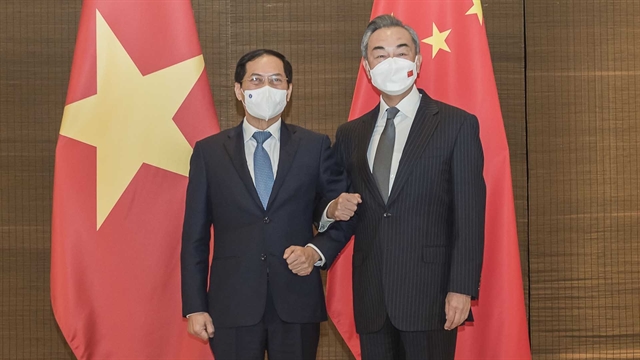
BEIJING — Vietnamese Minister of Foreign Affairs Bùi Thanh Sơn held talks with Chinese State Councillor and Minister of Foreign Affairs Wang Yi on Thursday in Hu Zhou City of China’s Zhejiang Province, during which they sought measures to bolster the Việt Nam-China comprehensive strategic partnership in the future and discussed a number of regional and international issues of shared concern.
Both sides shared delight at the progress of the bilateral partnership this year despite the impacts of the COVID-19 pandemic, with regular meetings between leaders of the two Parties and States as well as ministries, sectors and localities.
In the first 10 months of 2021, two-way trade rose 30 per cent year on year to US$133.65 billion, higher than the result recorded in the whole of 2020, they noted.
They agreed to increase high-level exchanges, optimising exchange and cooperation mechanisms through the channels of Parties and steering committees on bilateral collaboration, and strengthening comprehensive and effective coordination among ministries, sectors, localities and people, and beefing up the partnership in economy, trade and other promising areas.
The two sides discussed measures to enhance coordination in COVID-19 prevention and control in order to maintain trade and economic exchange activities.
Minister Sơn said he hopes the two sides will strengthen cooperation in the fight against the pandemic, especially in vaccine and treatment. He proposed China open its doors more widely to Vietnamese fruit, and facilitate border policies at the end of the year to avoid a backlog of goods at border gates between the two countries as well as contribute to the maintenance of the trade balance.

The Vietnamese foreign minister also wants further cooperation to expedite projects funded by China, to soon bring them into use.
For his part, the Chinese diplomat announced a CNY20 million ($3.13 million) assistance for Việt Nam to purchase medical equipment and 500,000 doses of COVID-19 vaccines for Vietnamese localities. He pledged that China would increase the import of Vietnamese products.
Both sides exchanged views on issues related to borders and territories, and agreed to strictly implement three related legal documents and coordinate closely in managing the shared land border and dealing with arising problems in a timely manner, thus building a shared borderline of peace, cooperation and development together.
The two foreign ministers concurred to continue to strictly abide by the joint perceptions reached by high-ranking leaders of both sides as well as the agreement on major principles guiding the settlement of maritime issues, control disputes at sea, and maintain peace and security in the South China Sea (called East Sea in Việt Nam).
They vowed to fully and effectively implement the Declaration on the Conduct of Parties in the South China Sea (DOC) and actively speed up negotiations for an effective and effective Code of Conduct in the South China Sea (COC) in line with international law, including the UN Convention on the Law of the Sea (UNCLOS) 1982. — VNS